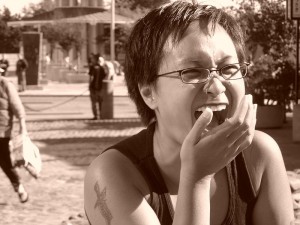Barbara Jane Reyes was born in Manila, Philippines, and raised in the San Francisco Bay Area. She received her B.A. in Ethnic Studies at U.C. Berkeley and her M.F.A. at San Francisco State University. She is the author of Gravities of Center (Arkipelago Books, 2003) and Poeta en San Francisco (Tinfish Press, 2005), which received the James Laughlin Award of the Academy of American Poets. Her third book, entitled Diwata, is forthcoming from BOA Editions, Ltd. in 2010.
Her chapbooks, Easter Sunday (2008), Cherry (2008), and West Oakland Sutra for the AK-47 Shooter at 3:00 AM and other Oakland poems (2008) are published by Ypolita Press, Portable Press at Yo-Yo Labs, and Deep Oakland Editions, respectively. Her poetry, essays, and reviews have appeared in Latino Poetry Review, New American Writing, North American Review, Notre Dame Review, XCP: Cross Cultural Poetics, among others.
She has taught Creative Writing at Mills College, and Philippine Studies at University of San Francisco. She lives with her husband, poet Oscar Bermeo, in Oakland.
***
LR: I wanted to start by talking about history, which is something that figures strongly in your poetry—for example in Poeta en San Francisco we see historical references mixed in with local references to San Francisco (SF) and the Beat Movement. Can you start by talking about how both history and geography are incorporated into your work?
BJR: I grew up on the periphery of SF, meaning that I lived in the East Bay for most of my life in this country. The more I came to see other parts of the country, I realized that there’s something interesting about SF and its history of people coming from so many different places and colliding with one another. I know this happens in every major American city, but for me SF has this unique place on the cusp of the Pacific Rim […] When the westward movement got to the Pacific Ocean, it just kept going into the Pacific. Just think about major American wars in Asia in the 20th century, and SF being a very important strategic point, and then Honolulu, and then Manila. What that means for all those people that get cast aside and spit out of that system is that they all end up with this baggage that they’re aiming at one another. That’s SF for me.
LR: And in your own personal history when did this dawn come?
BJR: It really did happen in college, as an undergrad at UC Berkeley. I remember reading Frederick Jackson Turner’s “The Frontier Thesis,” where he talks about the American identity—and here he really means the masculine identity created as these men are forging West and dealing with the landscape—that makes the American man different from the English colonial subject. What my professor argued was that the wars in the Pacific, starting with the Spanish American War and the Filipino American War, were an extension of that creation of the masculine American, because there wasn’t anywhere else to go but the ocean. The Philippines were seen in the Filipino American War as the starting point for America to get into China and start its own empire.
When I was hearing these things lectured to me and as I was reading about them, what I was seeing in SF started to really make sense—what I was witnessing and experiencing as a Filipino girl growing up in the Bay Area, not being able to find any evidence of long time Filipino settlement there, even though now I know that there is a much longer history. I always kind of felt like that there had to be some reason why so many of us just kind of got plopped in the city. And a lot of it had really to do with that movement into the Pacific once the frontier ended. Continue reading “A Conversation with Barbara Jane Reyes”
